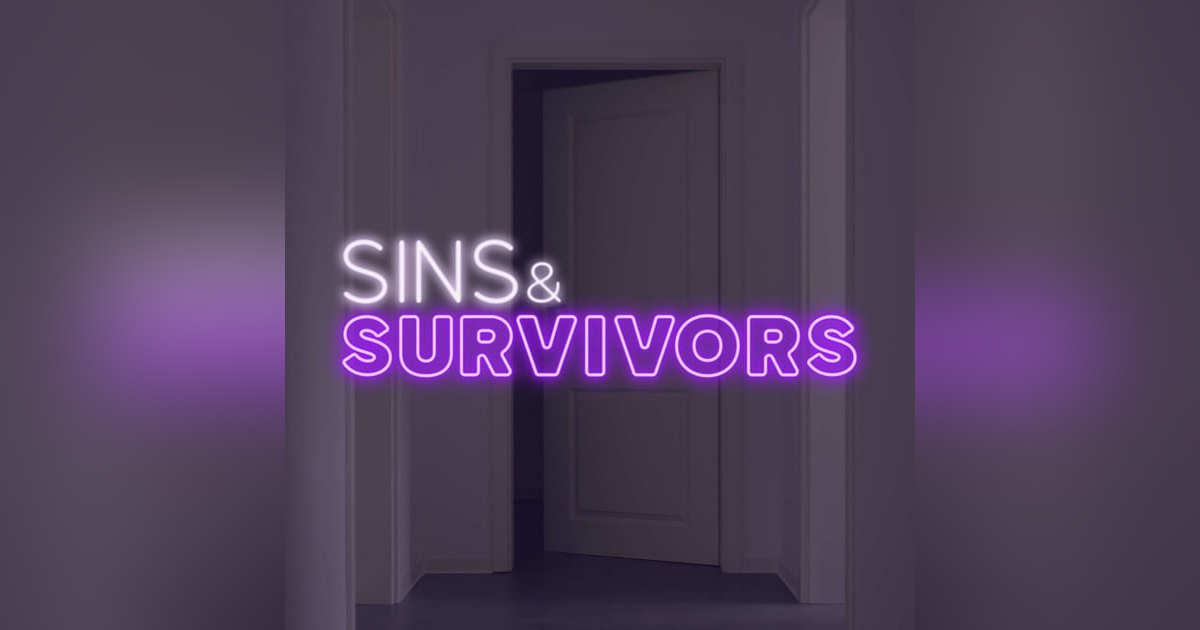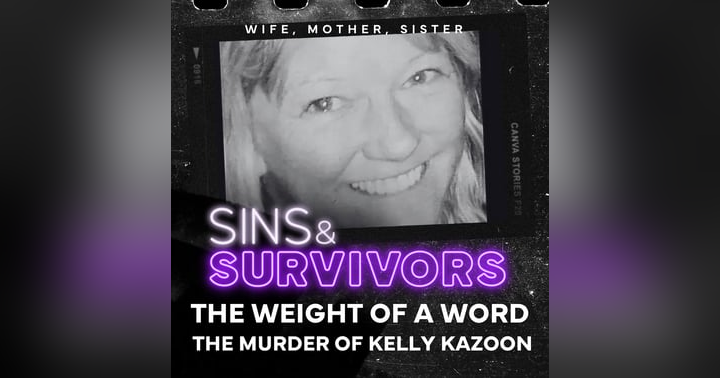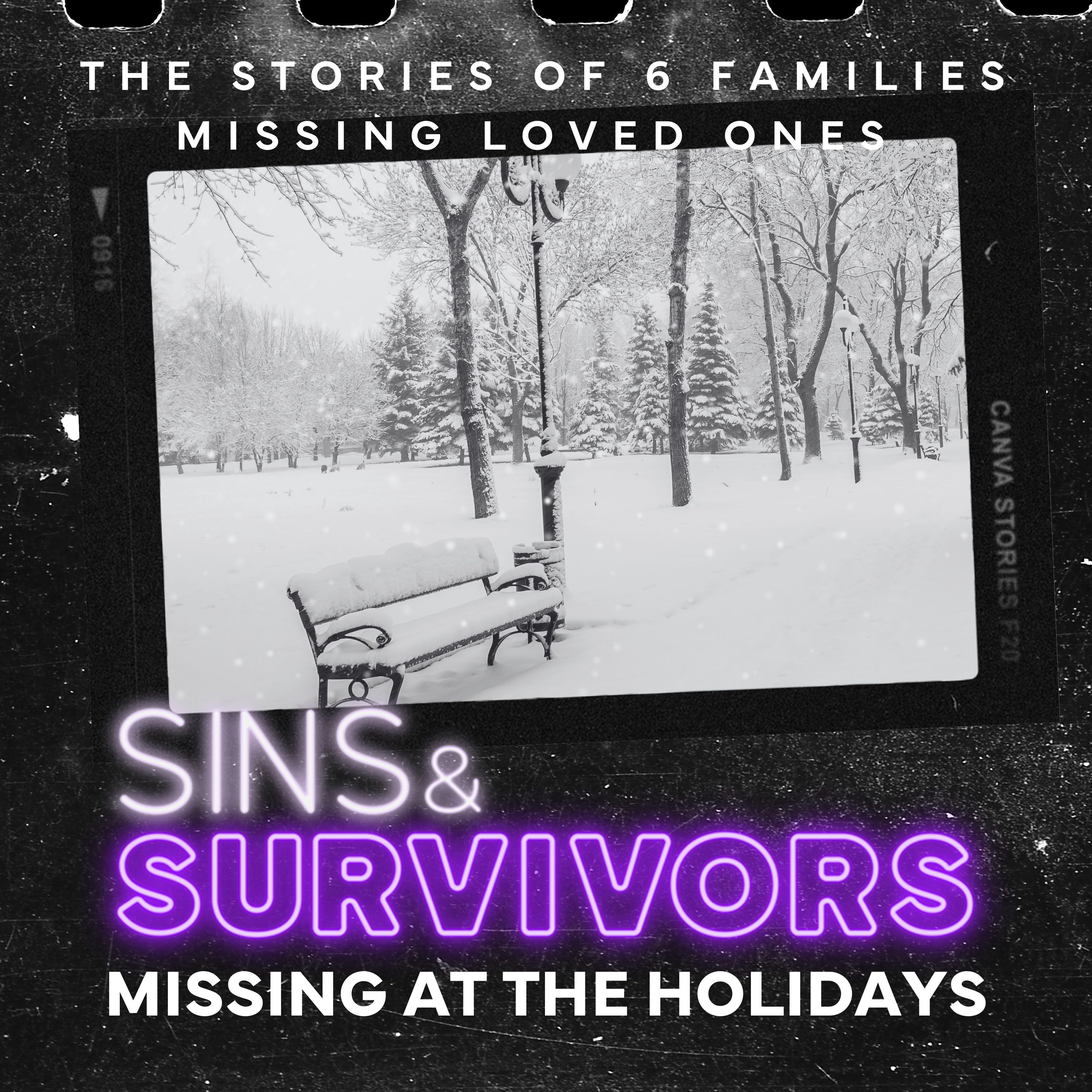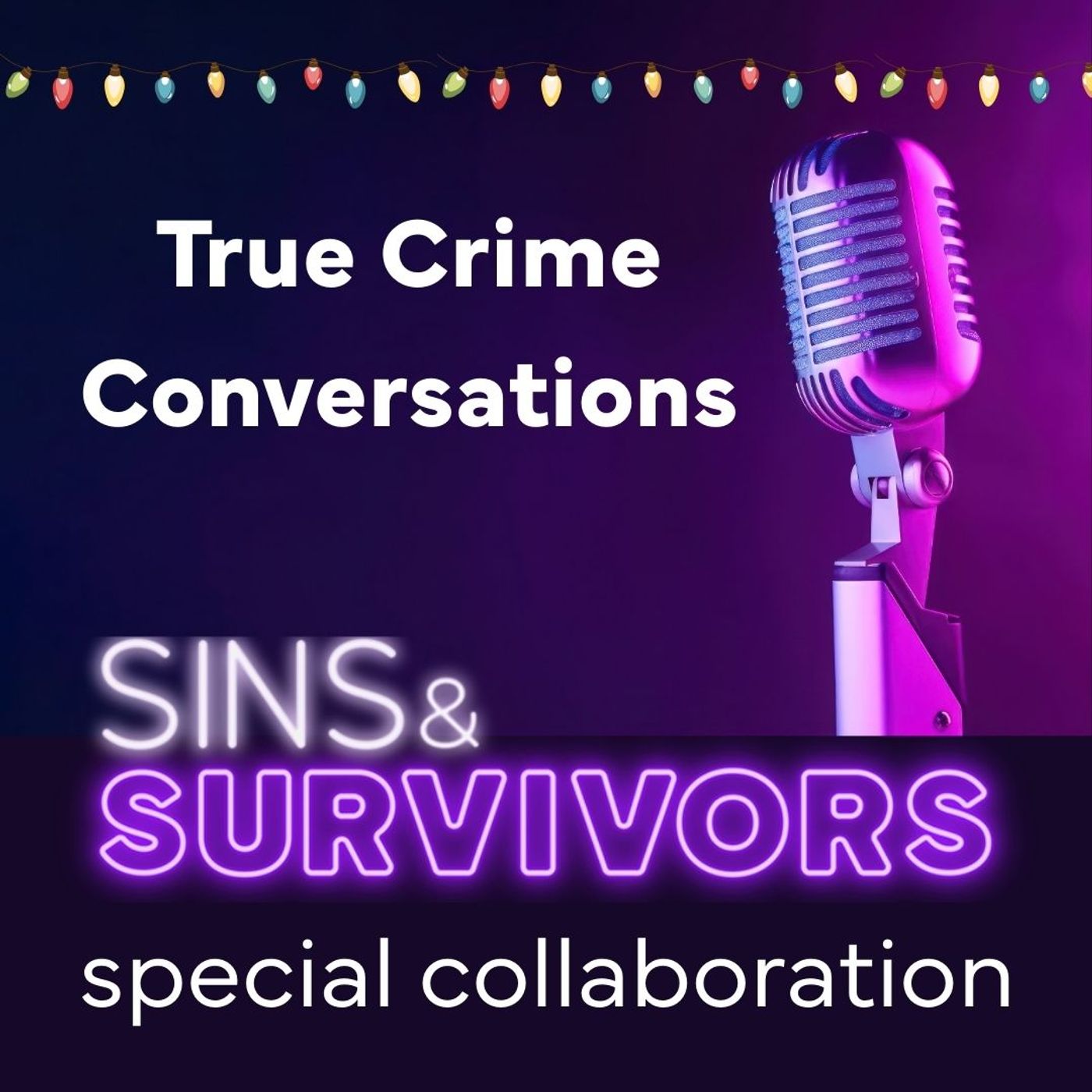The Murder of Kelly Kazoon
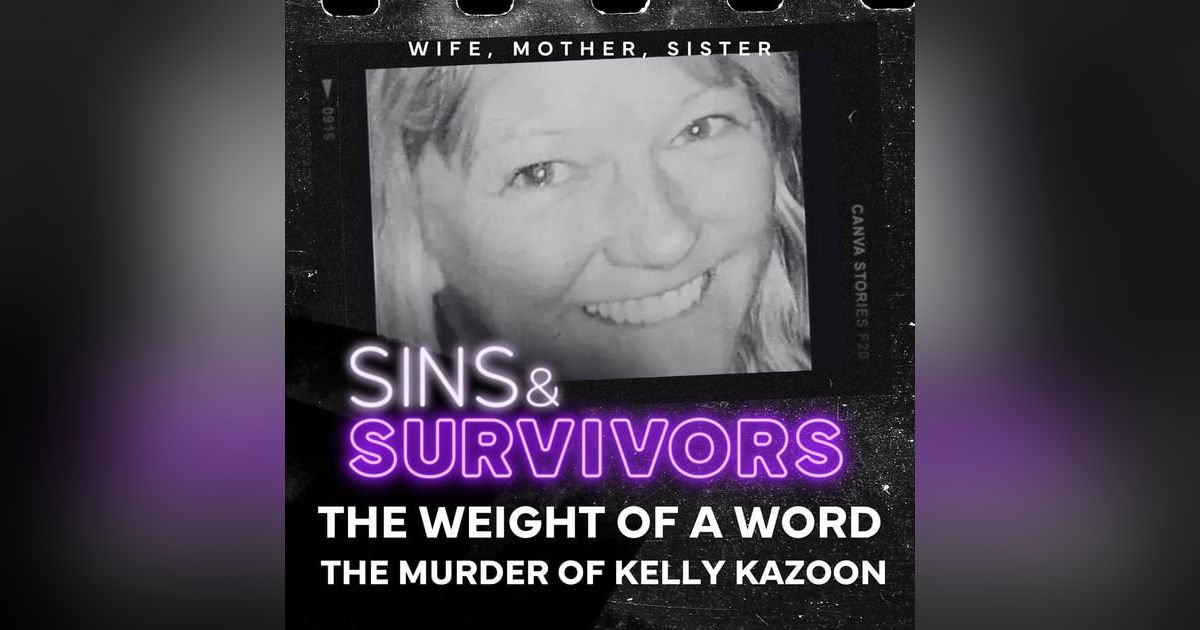
When someone is murdered in Las Vegas, headlines tend to follow a pattern: mention the crime and include a short, impersonal description of the victim.
In March of 2018, the headlines read, “homeless woman murdered.” That was the phrase police and the press used to describe the death of Kelly Kazoon.
But Kelly wasn’t just a homeless woman. She was a widow, a mother, and a friend. The man who killed her would try to say he had just blacked out and couldn’t remember what happened, but the evidence told a different story.
https://sinspod.co/89
https://sinspod.co/89blog
https://sinspod.co/89sources
https://sinspod.co/89sub (Substack Article)
Domestic Violence Resources
http://sinspod.co/resources
Click here to become a member of our Patreon!
https://sinspod.co/patreon
Visit and join our Patreon now and access our ad-free episodes and exclusive bonus content & schwag! Get ad-free access for only $1 a month or ad-free and bonus episodes for $3 a month
Apple Podcast Subscriptions
https://sinspod.co/apple
We're now offering premium membership benefits on Apple Podcast Subscriptions! On your mobile device
Let us know what you think about the episode
https://www.buzzsprout.com/twilio/text_messages/2248640/open_sms
Become a supporter of this podcast: https://www.spreaker.com/podcast/sins-survivors-a-las-vegas-true-crime-podcast--6173686/support.
Episode # 89 - The Murder of Kelly Kazoon
[Shaun]
When someone is murdered in Las Vegas, headlines tend to follow a pattern: mention the crime and include a short, impersonal description of the victim.
In March of 2018, the headlines read, “homeless woman murdered.” That was the phrase police and the press used to describe the death of Kelly Kazoon.
[John]
But Kelly wasn’t just a homeless woman. She was a widow, a mother, and a friend. The man who killed her would try to say he had just blacked out and couldn’t remember what happened, but the evidence told a different story.
(Music - Pause for 8 seconds)
[Shaun]
Hi, and welcome to Sins and Survivors, a Las Vegas true crime podcast, where we focus on cases that deal with domestic violence, as well as missing persons and unsolved cases. I’m your host, Shaun
[John]
And I’m your co-host, John.
[Shaun]
This week’s episode is about the 2018 murder of Kelly Deanne Kazoon, a woman whose life was so much more than the label the media gave her.
We’re going to tell you more about who Kelly really was, what happened to her, and how her family was determined to make sure she was remembered and that her killer was brought to justice.
[John]
As you said, Kelly was a wife and a mother. She was born on December 31, 1962, right here in Las Vegas, Nevada. As a young woman, she lived in Oklahoma and attended Broken Bow High.
She loved horseback riding, gardening, and fishing. She had a kind heart and a fearless sense of spontaneity. One story her sister-in-law Joanne Enriquez remembers fondly is the time Kelly pulled into their driveway with a truck bed full of snakes she’d decided to adopt on a whim.
According to her sister and family, Kelly loved all animals, and she was known for being quite generous. Her sister in law’s boyfriend, Pas Martinez, said that she would often let people who were struggling stay with her.
[Shaun]
Sadly, Kelly’s husband Daniel passed away from cancer in March of 2016. His death broke something inside her, and she mourned him deeply. As Pas told the press, “When he passed, she passed away with him.”
She began to drift. Her family said she “walked away from it all” - meaning the life she had while Daniel was alive. She left her home in east Las Vegas that the 2 of them shared.
Despite all she was going through, she never asked to move in with family. She didn’t want to be a burden, and when she reconnected with her friend Charles Talley, she was in a very vulnerable place.
[John]
Charles Thomas Talley was born on January 22, 1968, in Illinois. He served in the Navy in the late 1980s but was discharged in 1990, reportedly for issues related to drug use.
Based on court records, Talley didn’t have steady employment, and it’s not clear when he moved to Las Vegas. He was a member of the carpenters' union, but his work history is spotty. His most recent job was ringing the bell to raise money for the Salvation Army in mid-November 2018.
There was some evidence that Tally had sustained multiple head injuries during his lifetime, resulting in brain damage.
According to Talley, he was friends with Kelly for several years. In 2018, they reconnected and started a romantic relationship.
[Shaun]
On November 24, 2018, the Saturday after Thanksgiving, a woman was startled when her old upstairs neighbor knocked on her door at 3:30 in the afternoon. It was Charles (Tah-lee) Talley, who she thought had been evicted. He was naked, and he had blood on him. The press described him as being “covered in blood.” She immediately called 911.
When the police arrived, she directed them to what used to be Talley’s apartment. The police knocked, and he opened the door and welcomed them inside.
The officers walked into a horrifying scene. The apartment walls, ceiling, and carpeting had streaks of blood and bloody handprints. Kelly was on the floor, severely injured, badly beaten, and struggling to breathe.
She was rushed to Sunrise Hospital but died a short time later. The medical examiner determined she had been beaten, strangled, and sexually assaulted.
[John]
Homicide detectives determined that Talley had once lived in the apartment, but as his downstairs neighbor said, he had been evicted. The apartment had supposedly been cleared out and locked. According to the property manager, the unit had previously been leased to a woman named Delores Howard. If Talley had been staying there, that was a surprise to them.
“If he was staying there, we didn’t know about it,” the manager said. The company had changed the locks the week before, and they believed the apartment was empty.
Civil court records showed that both Talley and Howard had been evicted from a different property they shared in early 2017.
Talley waived his rights and agreed to speak to the detectives. They transported him to Metro Headquarters for an interrogation.
He said that he had brought Kelly to the apartment. He also told them that Kelly was resistant to having sex with him at first, but she later agreed, and their encounter was consensual.
From what the detectives had observed at the crime scene, the details he offered didn’t match up with the blood evidence at the apartment.
He also claimed he had been drunk and had blacked out, so he didn’t remember what had happened.
As a result of his statement, Talley was arrested and transported to the Clark County Detention Center. He was indicted on one count of open murder and 3 counts of sexual assault, and held without bail.
[Shaun]
Days after the murder, the Las Vegas Metro police issued a statement calling Kelly a “homeless woman,” and that’s how she was referred to in headlines and TV news reports.
These statements deeply troubled and enraged her family. “I am tired of hearing that she was a homeless person,” her sister in law, Joanne Enriquez, told the Review-Journal. “She was not actually homeless. She just didn’t want to burden anybody.”
Enriquez and others feared that the stigma of that label would make people care less about what had happened to Kelly. They were concerned that her death might be ignored and swept under the rug. If she was just a homeless person, Metro might not have pursued justice in the case as intensely.
The words we use matter. When police and the press label someone as “homeless,” it instantly creates distance. It allows the public to disengage because they think it’s not someone like them. That kind of language can rob victims of dignity.
And it shifts blame. It implies that violence was inevitable because of the victim’s housing status, not because someone chose to hurt them. That’s why Kelly’s family fought so hard to remind the world who she really was.
Her family was determined to make sure people knew how much Kelly was loved and to ensure they saw her as a whole person, and not just a statistic. “We will be in that courtroom,” Joanne said. “We will show him and the judge that she had people who loved her.”
[John]
People experiencing homelessness are far more likely to be victims of violent crime. They’re less likely to have access to secure shelter, healthcare, or advocates who will fight for them in court. When your world is unstable, predators exploit that.
Also, when the media overemphasizes the “homeless problem” and blames them for hurting businesses and neighborhoods, that can increase prejudice against unhoused people. And this can lead to them being targeted.
In many cases, the murders of unhoused people go unsolved because these victims don’t have families pushing for answers, or because society doesn’t view them as worth the same amount of justice.
Charles Talley’s trial began in District Court Judge Douglas Herndon’s courtroom in January of 2020. Prosecutors argued that the evidence of a prolonged attack, combined with Kelly’s extensive injuries, made clear that this was not consensual, but horrifically violent.
His defense counsel argued that he was too intoxicated to form the intent required for first-degree murder. Talley had told police that he blacked out because he was “not really a big drinker,” and that he had quit drinking four years ago. However, despite claiming amnesia, Talley remembered oddly specific things and prosecutors pointed out this inconsistency during the trial.
Also, Talley’s own expert witness, Dr. Sharon Jones-Forrester, a clinical Neuropsychologist, contradicted the claims he made to police. She had examined Talley and testified that he was a chronic alcoholic who had continually drank alcohol for over ten years before his arrest.
The jury did not buy any of Talley’s story, or if they did believe him, they decided it didn’t make him any less guilty. After only 3 hours of deliberation, he was found guilty of 1st degree murder and 2 counts of sexual assault.
[Shaun]
Kelly’s sister, Alice Garcia, spoke to the press outside the courtroom. “I feel sorry for his family,” she said. “That’s a hard thing to have to go through. But not as sorry as I do for our family. I’m happy with the verdict, and I’m sure she is, too.”
At sentencing in March of 2020, Talley still refused to take responsibility. “There was no rape,” he told the court. “She wasn’t raped. And then I did not beat her. She had a seizure. It was convulsions. I didn’t do that to her.”
Judge Herndon told him, “Your complete inability to accept any responsibility for what was done to that woman is a scary thing. It’s a scary thing.”
He was sentenced to life with the possibility of parole after 30 years. At the time of sentencing, Talley was 52 years old. With credit for time served, he will be 80 years old before his first parole hearing. Although he is eligible for parole, this will likely end up being a life sentence for him.
Talley appealed his conviction, mostly on the grounds of ineffective assistance of counsel. He argued that his attorney undermined his claims when he used the testimony of Dr. Jones-Forrester, but the court found that none of the errors he pointed out would have changed the outcome of the trial. In May of 2025, his conviction was affirmed.
[John]
This case led us to investigate whether or not Kelly being labeled as homeless could have prevented Talley from being brought to justice. We discovered that in cities across the U.S., unhoused people are being killed at alarming rates. Since 2010, the homicide data from 15 major cities, including Las Vegas, showed that more than 1,000 people experiencing homelessness have been murdered.
In 2020, cities like Las Vegas, Portland, and Miami reported around 200 homicides per 100,000 unhoused residents. That’s more than 25 times the national average for murder rates, which is just under 8 per 100,000 people.
The most recent data shows that the murder rate among unhoused people actually outpaces that of cities with the highest overall homicide rates, like St. Louis, showing that these aren’t isolated cases; they’re part of a national pattern.
It’s clear that the murder rate of unhoused people is staggering, as we noted earlier. Their unhoused status and other factors make them a very vulnerable population.
[Shaun]
We looked into whether a victim being labeled as homeless can shape how their death is investigated and whether the public pays attention at all.
In Los Angeles in 2023, 10 murder victims were identified as unhoused people, and the clearance rate was abysmal. Of those 10 murders, only 1 had been solved.
In Denver, between 2008 and 2018, 39 homeless people died by homicide. More than a dozen of those cases remain unsolved.
If Kelly had been a 30-something suburban mom with young kids found murdered in her home, we’d probably all know her name by now. There would be true crime specials and headlines for months. But she was 55, grieving, and between homes, so the coverage was minimal, and the tone was cold, impersonal, and distant.
We also want to note that Nevada has some of the highest rates of housing insecurity in the country. Thousands of people in Las Vegas are one eviction, one paycheck, or one crisis away from being on the street. Sadly, it doesn’t take long before society stops seeing you as someone worth protecting.
[John]
If you take one thing away from Kelly’s story, let it be this: no one deserves to be forgotten, and no one deserves to be reduced to a label. We are thankful for Kelly’s family and the work they did to help all of us learn who she was.
Thank you as always for listening. Remember to follow us on Instagram and share the podcast with a friend. We appreciate all of you for listening and supporting the show.
Until next week, we remind you want happens here happens everywhere.
https://docs.google.com/document/d/1TZr6KeSja0jKKfNnvr5xwIFthgdnOe7fKaa-tECPGdY/edit?usp=sharing
